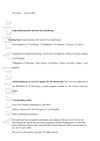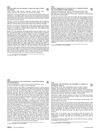 December 2023 in “International Journal of Molecular Sciences”
December 2023 in “International Journal of Molecular Sciences” Men with early balding showed higher levels of certain genes linked to hair loss and possibly prostate cancer.
 1 citations,
January 2016 in “Journal of stem cell research and medicine”
1 citations,
January 2016 in “Journal of stem cell research and medicine” Fat-derived stem cell therapies can potentially increase hair growth and thickness in people with hair loss.
 1 citations,
January 2016 in “Journal of stem cell research and medicine”
1 citations,
January 2016 in “Journal of stem cell research and medicine” Fat-derived stem cell therapies can potentially increase hair growth and thickness in people with hair loss.
 6 citations,
November 2017 in “Journal of the European Academy of Dermatology and Venereology”
6 citations,
November 2017 in “Journal of the European Academy of Dermatology and Venereology” A woman got melanoma on her scalp after anti-hair loss treatment with injections.
 September 2023 in “International Journal of Trichology”
September 2023 in “International Journal of Trichology” Adipose-derived stem cells may help with hair loss, but more research is needed.
 44 citations,
June 2018 in “Journal of Cellular Physiology”
44 citations,
June 2018 in “Journal of Cellular Physiology” Researchers developed a 3D model of human hair follicle cells that can help understand hair growth and test new hair loss treatments.
 November 2024 in “EMJ Dermatology”
November 2024 in “EMJ Dermatology” A new topical treatment using SAMiRNA technology shows promise in increasing hair growth for androgenetic alopecia.
January 2022 in “Aesthetic surgery journal” Extracellular vesicles may effectively treat hair loss with minimal side effects.
2 citations,
June 2021 in “Sultan Qaboos University medical journal” Familial frontal fibrosing alopecia is rare, mostly affects women, and often occurs between sisters or mother-daughter pairs.
 14 citations,
April 2006 in “Expert Review of Dermatology”
14 citations,
April 2006 in “Expert Review of Dermatology” Antiandrogen therapy helps treat genetic hair loss.

Avicennia marina extract and avicequinone C can potentially promote hair growth and treat hair loss by interfering with hair loss mechanisms and boosting growth factors.
August 2024 in “Journal of Clinical Medicine” Low-level laser therapy is the most supported treatment for hair loss, but other methods show promise.
 July 2018 in “Nasza Dermatologia Online”
July 2018 in “Nasza Dermatologia Online” Frontal fibrosing alopecia and ulerythema ophryogenes may be related and can evolve from one to the other.
 6 citations,
January 2015 in “Dermatology”
6 citations,
January 2015 in “Dermatology” Trichoscopy helps diagnose hair and scalp problems but isn't always definitive and should be used with other methods.
 7 citations,
October 2019 in “Evidence-based Complementary and Alternative Medicine”
7 citations,
October 2019 in “Evidence-based Complementary and Alternative Medicine” Chinese medicine may help hair growth and reduce hair loss in androgenetic alopecia.
 1 citations,
September 2016 in “Actas Dermo-Sifiliográficas”
1 citations,
September 2016 in “Actas Dermo-Sifiliográficas” 5-alpha reductase inhibitors may cause sexual side effects, breast complications, and other health risks in men with hair loss.
 42 citations,
March 2006 in “Drug Discovery Today: Therapeutic Strategies”
42 citations,
March 2006 in “Drug Discovery Today: Therapeutic Strategies” The conclusion is that we need more effective hair loss treatments than the current ones, and these could include new drugs, gene and stem cell therapy, hormones, and scalp cooling, but they all need thorough safety testing.
 September 2023 in “Cureus”
September 2023 in “Cureus” Dr. SKS Hair Booster Serum effectively treats hair loss in women with PCOS.
 June 2020 in “Journal of Dermatological Treatment”
June 2020 in “Journal of Dermatological Treatment” Use telemedicine and strict hygiene for safe hair and scalp treatments during COVID-19.
 August 2018 in “Journal of The American Academy of Dermatology”
August 2018 in “Journal of The American Academy of Dermatology” Melanoma survival rates vary by state and are better where incomes are higher, more people have health insurance and education, and there are more dermatologists.
 January 2016 in “Global dermatology”
January 2016 in “Global dermatology” A treatment called Cellcurin, combined with microneedling, significantly increased hair density and diameter in patients with hair loss.
 June 2024 in “Bőrgyógyászati és Venerológiai Szemle”
June 2024 in “Bőrgyógyászati és Venerológiai Szemle” New treatments for hair loss, like JAK inhibitors, PRP, anti-androgens, and minoxidil, offer better options.
 1 citations,
December 2019 in “Dermatologic Therapy”
1 citations,
December 2019 in “Dermatologic Therapy” Only anti-androgenic drugs likely halt AGA progression.
 29 citations,
August 2017 in “Skin appendage disorders”
29 citations,
August 2017 in “Skin appendage disorders” IGF-1 may affect hair growth and loss, but more research is needed to confirm effective and safe treatments.
 13 citations,
April 2022 in “Anais brasileiros de dermatologia/Anais Brasileiros de Dermatologia”
13 citations,
April 2022 in “Anais brasileiros de dermatologia/Anais Brasileiros de Dermatologia” The document concludes that more research is needed to find effective treatments for Lichen planopilaris and Frontal fibrosing alopecia.
 November 2023 in “Translational Medicine Communications”
November 2023 in “Translational Medicine Communications” Derinat may improve hair growth and quality of life in hair loss patients by reducing oxidative stress.
 91 citations,
August 2015 in “Anais Brasileiros De Dermatologia”
91 citations,
August 2015 in “Anais Brasileiros De Dermatologia” Female Pattern Hair Loss affects women's self-esteem and needs more research for better treatment.
1 citations,
January 2022 in “Springer eBooks”  1 citations,
February 2021 in “Journal of Dermatological Treatment”
1 citations,
February 2021 in “Journal of Dermatological Treatment” Artificial hair implants can quickly improve looks and life quality, but they have risks like infection and early fiber loss, so more research is needed to confirm their safety and effectiveness.
 June 2024 in “Computational and Structural Biotechnology Journal”
June 2024 in “Computational and Structural Biotechnology Journal” Multi-omics techniques help understand the molecular causes of androgenetic alopecia.

























